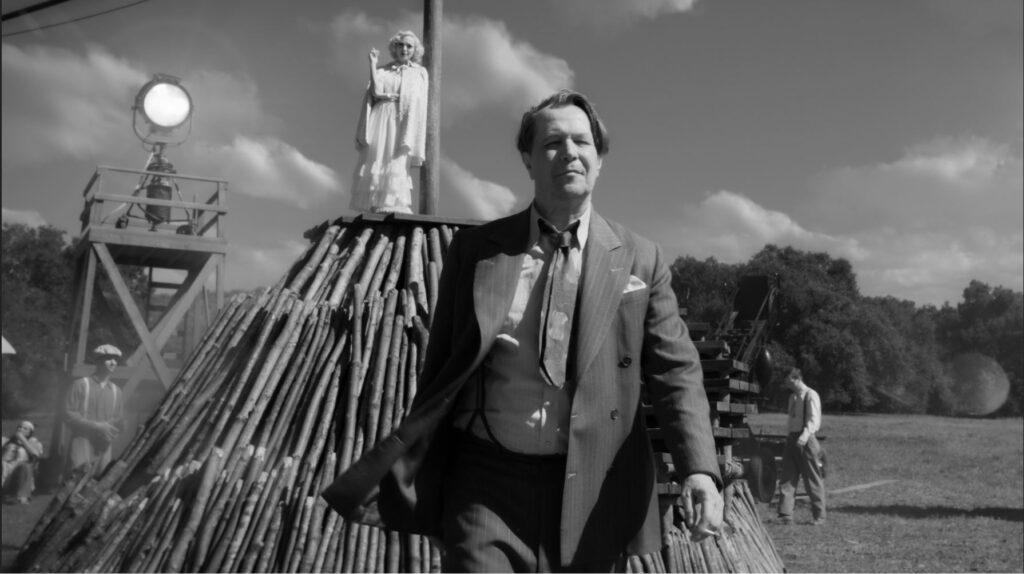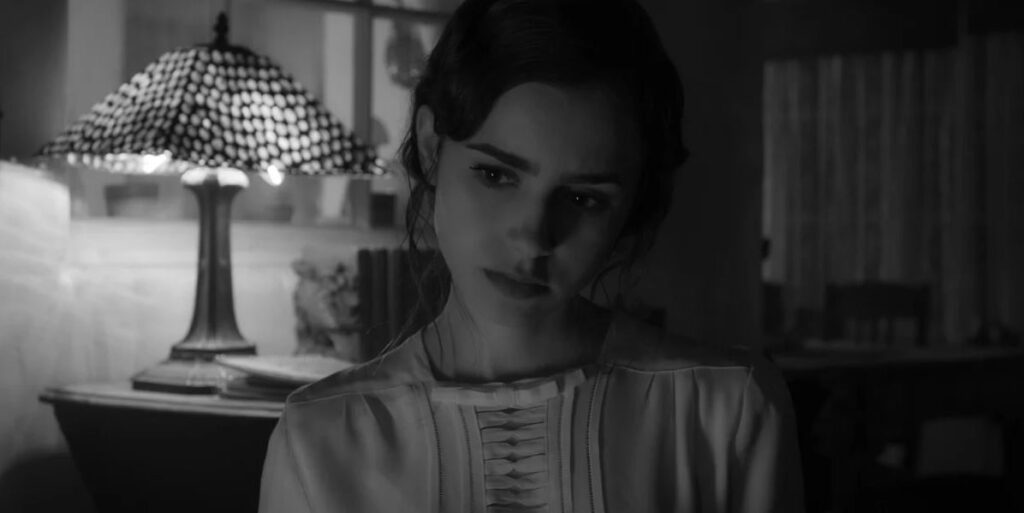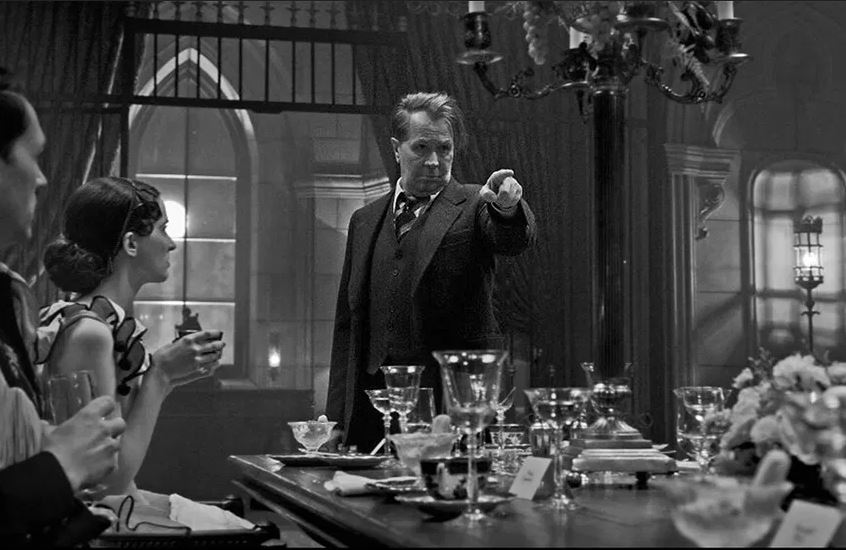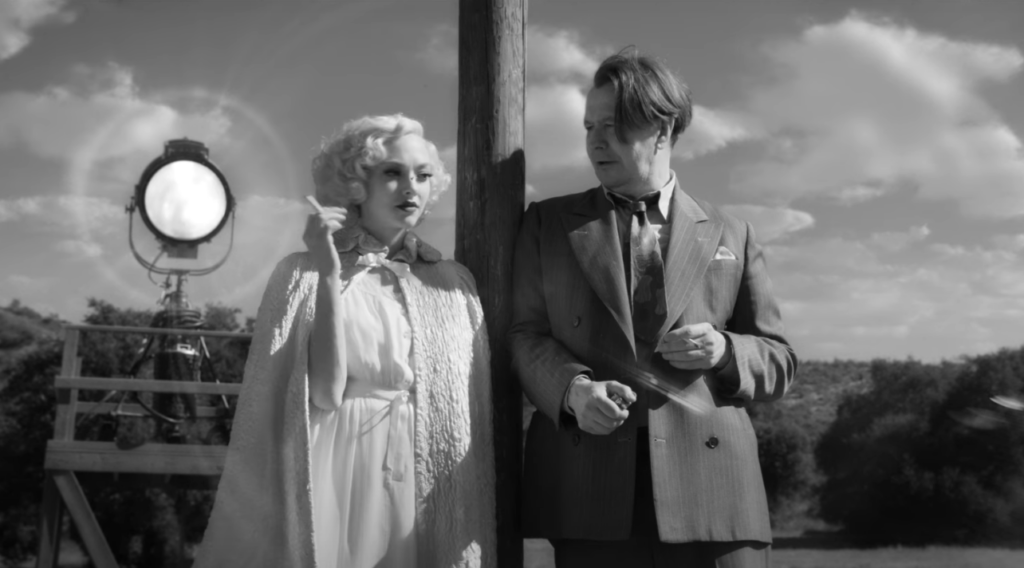
There are two artistic geniuses wrestling for control of Mank, and neither of them is Orson Welles. The first is the film’s subject, Herman J. Mankiewicz, the co-writer of Citizen Kane, which has long been labeled the greatest movie ever made; the second is its creator, David Fincher, the director of a handful of masterpieces in his own right. As played by Gary Oldman, Mankiewicz (for his preferred sobriquet, refer to the title) is an intuitive creature—brilliant, yes, but also slovenly, undisciplined, and erratic. Fincher is none of those things, save brilliant. He is an impeccable craftsman, one who wields his tools with finicky precision and absolute rigor. The animating force of Mank—the fascinating dissonance that’s responsible for much of its power, as well as some of its shortcomings—is the inherent tension between its central personalities. This is what happens when an Order Muppet makes a movie about a Chaos Muppet.
The narrative of Mank is alternately gripping and muddled, but when it comes to technique, no amount of turmoil could ever overwhelm Fincher’s mastery. As a matter of sight and sound, his latest picture is a characteristic wonder to behold. Shot by Erik Messerschmidt (Mindhunter) in luminous black and white, its images nevertheless feel suffused with color and vibrancy, light and shadow playfully dancing with one another throughout the frame. (This is undoubtedly the most beautiful black-and-white Netflix release since, er, two years ago.) The costumes and production design meticulously recreate 1930s California without preening, while the score (from Trent Reznor and Atticus Ross, naturally) bubbles with percussive urgency yet never overexerts itself. In tone and texture, Mank feels both pleasingly classical and thrillingly new. (Fincher should probably cool it with the phony cigarette burns, though.)
The story of Mank shouldn’t be confused with the story of Mank. Sure, the film could reasonably be called a biopic, given that it spans roughly a decade of its protagonist’s life, chronicling his triumphs and failures while also depicting his tussles with various angels and demons. But Fincher, working from an old script written by his late father, Jack, isn’t spinning a Great Man yarn here, any more than he was when he ruthlessly dissected the founding of Facebook in The Social Network. Mank isn’t really about exploring the life of its flawed hero, nor is it really about the creative conflicts—financial, personal, philosophical—that spawned Citizen Kane.

So, what is it really about? Is it a sobering study of alcoholism? A clear-eyed deconstruction of Old Hollywood mythology? A scathing exposé of political machinery and industrial corruption? A lively workplace comedy? Mank strikes me as all and none of these things, variously shifting its mood and tempo as quickly (though not as fluidly) as it slides between time periods. Perhaps this inconsistency is designed to mirror its subject’s booze-soaked consciousness, but I suspect it’s less a matter of clever ambiguity than a simple lack of focus. Late in Kane, a woman assembles a jigsaw puzzle; Fincher has crammed his own movie full of interesting material, but the pieces don’t always fit.
Those kinds of glib Kane comparisons are inevitable, so much so that Mank obligingly traffics in some meta moments. At one point, the perpetually frustrated producer John Houseman (Sam Troughton) complains that Mank’s time-hopping draft will be too confusing for mainstream audiences. Mank itself deploys a nonlinear structure, but there’s no fear of disorientation here; every shift in setting is accompanied by some handy text, written in screenwriting parlance (“EXT. MGM STUDIOS—DAY—1934—FLASHBACK”), that neatly sets the scene. In fact, aside from repeated returns to 1940—when Mank barks dictation to a secretary (Lily Collins) while conspiring with a housekeeper (Monika Gossmann) to sneak whiskey under Houseman’s nose—the film’s progression is fairly straightforward. It follows Mank throughout the ’30s as he mentors young writers, charms various women, exasperates bosses, alienates Hollywood royalty, and develops an oddly symbiotic relationship with the media mogul Charles Foster Kane William Randolph Hearst.
The simmering friction between Mank and Hearst, underplayed nicely by Charles Dance, is one of many strained pairings that Mank uncovers but never fully excavates. Yet this lack of depth isn’t entirely a problem, seeing as how the movie skitters so easily across its gorgeous surfaces. Despite its epic sensibilities, it’s most at home as a spry dialogue comedy; early scenes of Mank yammering with other tradesmen, pitching stories and swapping bon mots, pulse with intelligence and camaraderie. The elder Fincher’s script is unashamedly erudite—when Joe Mankiewicz (Ozark’s Tom Pelphrey) grumbles that he’s only earning half his brother’s salary, Mank responds, “You’re half my wit, how much do most half-wits get paid?”—but in a way that venerates its hero rather than itself.

The opening act of Mank is such a delightful good time, it’s almost a shame when its taste grows more acidic. The turning point is a crisply orchestrated sequence set in 1933 at Heart’s castle (yep, the dude had a castle), where he’s hosting the birthday party of Louis B. Mayer (Arliss Howard), the MGM bigwig whose casual venality draws Mank’s scorn. Littered with celebrity references (I spotted Eddie Cantor at one point, though I surely missed dozens more), the scene develops a sinister air as the characters debate politics—at one point, Mank coolly educates the other guests on the difference between socialism (“everyone shares the wealth”) and communism (“everyone shares the poverty”)—and the conversation turns to some troubling incidents in Germany. “What’s a concentration camp?” someone asks, and the question is both pitiful and scary.
From this point forward, Mank acquires a political dimension that never properly dovetails with its other elements. There’s a subplot in which a guilt-ridden filmmaker (Jamie McShane) despairs over his role in manufacturing propaganda that’s designed to swing the 1934 California gubernatorial election toward Hearst and Mayer’s preferred candidate and away from Upton Sinclair; it’s interesting enough material on its own, but it feels shoehorned in, and even if it’s meant to inflame Mank’s ire—thereby inspiring him to pen Kane’s anti-Hearst screenplay—it isn’t adequately grounded in character.
Structurally, Fincher shapes Mank as a string of battles, watching ruefully as his aggrieved soldier wages scholarly war against cruel and selfish foes. Yet while the movie possesses a decidedly masculine energy, its most meaningful relationship isn’t between Mank and any of the men he spars with, be they Hearst, Mayer, Joe, or Irving Thalberg (Ferdinand Kingsley). It certainly isn’t the one between Mank and Welles, who flits in for a few scenes in the person of Tom Burke as an arrogant narcissist. It is instead the unusual friendship between Mank and Marion Davies (Amanda Seyfried), Hearst’s decades-younger paramour and a less-than-stellar actress. Mank and Marion are very different people, but their shared respect feels honest and gratifying, lending the film its flicker of emotional resonance. Credit must go to Seyfried, who brings a radiant glamour to the role—her body seems to absorb the light from Messerschmidt’s camera—while adding a twinge of knowing sadness.

As for Oldman, he replaces the boisterous swagger that earned him an Oscar for Darkest Hour with something marginally less triumphalist; his Mank is a jocular intellectual, one whose winking superiority is occasionally flecked with resentment and rage. Despite his intermittently garbled Brooklyn accent, it’s a fun performance; when Hearst declares that he keeps Mank around for his scabrous humor, you get what he means, and you can even sense a glimmer of genuine affection between the two future enemies.
And for all its faults, Mank itself is always good company. Fincher never entirely succeeds in fusing the story’s many jumbled parts into a lubricated machine, but in its own weird way, the movie’s internal struggle between logic and bedlam is healthily democratic. All of the secondary characters and all of the subplots muscle one another around, and the infighting becomes a participatory event, bringing us along for the stunning, squalid ride. At certain moments, we share in the misery. But for the most part, we share in the pleasure.
Grade: B
Jeremy Beck is the editor-in-chief of MovieManifesto. He watches more movies and television than he probably should.
